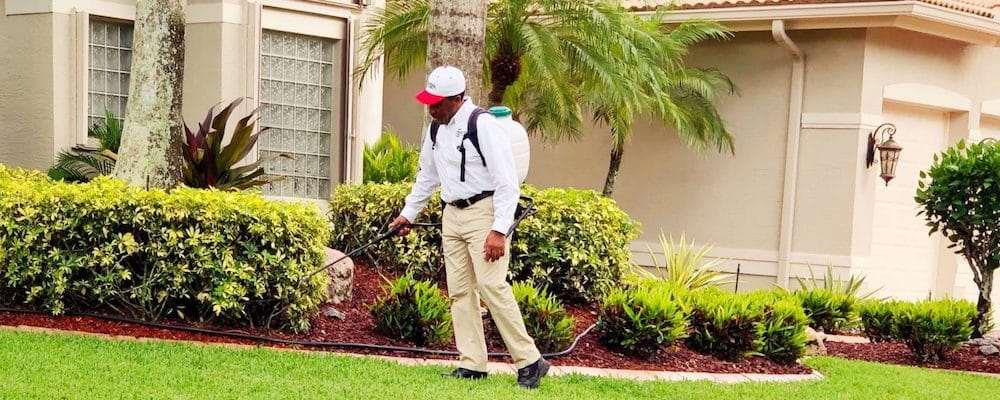
With the drastic decline in pest activity in Florida’s winter months, it’s easy to forget the problems they create the rest of the year. Today’s article covers the importance of year-round pest control and why you should avoid slipping up on pest control measures even with the drop in temperature.
Despite Florida’s winters being the mildest of any state, residents still enjoy a decrease in pest activity during the coldest season. Many assume this is because the pests migrate or die off during this time, and some do. But while others may stop buzzing and biting and destroying your home for a while, they’re much closer than you think.
In fact, the mildness of Florida’s winters is one of the key reasons the state has pests year-round. Winters are rarely cold enough for temperature-based natural pest control, and pest sightings at this time are still common. Florida’s residents must remain vigilant throughout winter to eliminate the pests hiding in their homes, waiting to create a bigger problem come spring.
Will your household need pest control services this winter? The answer may surprise you. Read on to get the answers from our pest control professionals.
When Is ‘Pest Season’ in South Florida?
Florida sits in two different climate zones. As a result, the duration and intensity of the seasons can differ between tropical Southern Florida areas like Coral Springs, Palm Beach, and Broward, and the subtropical North-Central region of the state. If you live in South Florida where it’s warmer and more humid, winter temperatures averaging 65 degrees typically run from December to late February/early March. Further north, winters averaging 41 degrees Fahrenheit run from November through late March and early April.
Though many of Florida’s pests such as roaches, rats, termites, bed bugs, ants, and mosquitoes remain active from January to December, most reach peak activity during the warmer spring and summer months as there are more food sources for them to replenish their population and wreak havoc around the home. Once the temperature begins to fall in late autumn, so does their activity, and ‘pest season’ draws to a close. But professional exterminators still have their work cut out for them.
What Happens to Pests During Winter?
Cold-blooded creatures like cockroaches and mosquitoes depend on heat from the environment to regulate their temperatures, which are ideal during the summer. Many of Florida’s common pests cannot function below 50 degrees Fahrenheit and die once temperatures hit freezing.
Unfortunately (or fortunately), it does not typically get cold enough in North or South Florida for the latter to happen, but winter lows can reduce certain pest activities.
- Cockroaches – After the rain and heat of late summer create warm, humid spaces for them to thrive, cockroaches lose their ability to reproduce below 45 degrees, and die off once it hits 15 degrees.
- Mosquitoes – These disease-carrying pests stop functioning at 50 degrees but combat the shutdown of their biological functions by entering a dormant state known as diapause. Their internal processes become suspended, preserving them and the diseases they carry until spring. Some species will pause as eggs, while others pause as larvae or adult mosquitoes. Mosquito eggs can remain viable for up to eight months.
- Bed bugs – Like mosquitoes, bed bugs will hibernate once it gets too cold, but if they are inside your home where it is warm, this will not affect their ability to cause an infestation. Make sure to read our article on bedbugs to know which warning signs to look for.
- Ants and Termites – These pests are resilient. While they may not die off during Florida’s winters, they are far more likely to create nests in the warmer areas of your home, causing hundreds or thousands in damage and threatening structural integrity.
- Spiders – Even in colder states, some species can withstand sub-zero temperatures and are a common presence year-round in Florida. However, they gravitate to warmth and will try to live in your home during the winter.
- Rats – Rats are warm-blooded and do not hibernate, but their numbers decrease during winter as their priority changes from breeding to finding shelter and warmth. Like termites and other insects, they can continue causing damage to your home.
Where do Pests Hide During the Winter?
If you employed the services of a professional exterminator during the year, they would have recommended ways to pest-proof your home. Closing off access points in your home is a natural pest control measure that prevents pests from surviving in areas such as:
- Inside walls, attics, and insulated areas – Pests like rats, spiders, and cockroaches will attempt to hide in undisturbed areas and forage for food after you’ve gone to bed. Their activity is most audible when the house is quiet.
- Kitchens and Bathrooms – Mosquitoes and cockroaches love warm, humid areas, especially those with standing water where mosquitoes can lay eggs and the cockroaches can drink.
- Wooden Areas – If you have dry wood in your home, it’s important to check for signs of termite infestation. Certain species of cockroach will also feed on dead or rotting wood.
- In Cracks and Furniture Seams – Bed bugs prefer to stay close to sleeping areas, as it presents the most opportune times for them to feed. Beds, couches, dressers, and even clothing could serve as hiding places.
- Anywhere with a food source – Many pests thrive indoors because of food sources such as open trash cans and pet bowls. Cleaning regularly helps drive them away.
When to Call Pest Control Services during the Winter
If you employed the services of a professional exterminator during the year, it is reasonable to assume there are not many pests hiding on your property. However, if any of the following applies to you, it may be time to have your pest control service provider come by for a winter checkup.
- You had an infestation at the end of the season – If the number of pests around your home decreased at the start of the winter season, they might still be around waiting for spring to come back in full force.
- You are still seeing signs of infestation – From rat droppings and roach stains to mosquito bites, if you’re seeing signs that pests are still active in your home in winter, you most likely have an issue.
- You tend to see a huge number of pests in early spring – If your springs start with a sudden significant increase in mosquitoes, termites, cockroaches, or other types of pests, you most likely have a lot of them spending winter hidden on your property each year.
By securing professional pest control services, you can protect yourself and your family ahead of next spring.
South Florida Pest Control Services from Gregory’s Pest Control
The safest, most effective way to remove bugs, pests, and rodents from your Florida home is to get a full-service treatment from a professional exterminator/pest control services provider.
Gregory’s Pest Control, based out of Coral Springs, Florida, has over thirty years of experience protecting families in Broward, Palm Beach, and other South Florida areas from infestations. We also have a barrier protection program to eliminate entry points and breeding areas, and an advanced maintenance service that sees one of GPC’s expert personnel returning to maintain that barrier protection every 60-90 days.
Visit our pest control services page to get a free quote or schedule a complimentary pest evaluation visit.

Paul Gregory
Owner/President of Gregory’s Pest Control
I’m a 2nd generation pest control owner who started working for my father in 1999. I was raised in South Florida and feel blessed to call it home for my entire adult life. As a long-term Florida resident, I recognize the challenges of controlling the many different pests that thrive in our subtropical climate. In particular, I understand how difficult it can be to prevent pests from invading our homes and businesses. By helping families solve their pest problems so they can live safer, more comfortable lives, I feel I am also meeting my family’s commitment to help our community. When I’m not out fighting pests, you can find me on the golf course or out on a soccer field where I have been fortunate enough to coach soccer to kids of all ages for the past 20 years.




